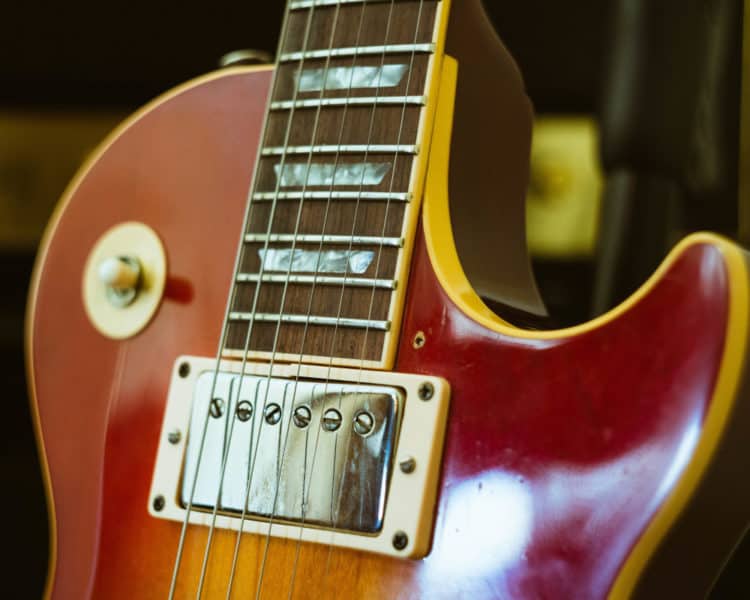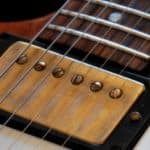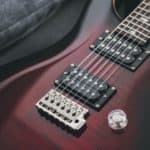“So we were headlining the festival that year and twenty minutes before we were due to go on, I realized that my bridge pickup sounded weak.
Luckily I had a big magnet with me and I was able to re-magnetize my pickup in time for the show. The crowd loved us!”
Uhhhhhhh… cool story bro.
But could this really happen?
Guitar pickups can demagnetize. However, although a magnet’s strength does degrade over time it is not usually relevant to us since a magnet’s lifespan exceeds our own. But there are some exterior circumstances to look out for that can reduce that lifespan and affect electronic pickups.
Jokes aside, to get to the heart of the matter of pickups demagnetizing you have to dig down all the way to the sub-atomic level.
Because this is where the magic of magnetism is taking place and the ways that a pickup can lose its magnetic field are related to the electrons in the metal’s atoms.
Don’t worry, this stuff hurts my brain too. So after a short deep dive, we’ll come up for some air and examine what it means for practical applications.
How do guitar pickups work?
Pickups consist of magnets which are then wrapped in a coil of copper wire and this is all contained in something called a bobbin.
The two main magnet types are Alnico (aluminum, nickel, and cobalt alloy) and ceramic (iron and strontium carbonate, a mineral).
A magnet has a magnetic field that you have probably experienced if you have ever played with one.
Since the guitar strings are metal, when they vibrate close to the magnet they disturb the magnetic field and the wire coil captures this “disturbance in the force” as an electrical current.
This current travels through the controls of the instrument, the amplifier, and is then converted back to vibrations in the speaker by the reaction between the speaker’s magnet and voice (wire) coil.
Can the magnetic field of pickups fade off?
Before discussing how metal becomes demagnetized it is important to understand how it is magnetized.
Metal can be magnetized by rubbing a strong magnet along with it multiple times in one direction.
This aligns the electrons of the atoms in a specific direction (north/south) and this is basically magnetism.
This alignment will slowly degrade over time because of the natural vibration of atoms, even at room temperature, and this applies to guitar pickups as well.
How long does it usually take for pickups to demagnetize?
How long it takes a magnet to demagnetize depends on the initial strength of course.
But the length of time for a magnet to naturally lose its charge is usually estimated at 100 years or more.
So it isn’t really something you should worry about too much if you take care of your instruments.
If you have a guitar from the 1950s or 1960s I suppose you could have issues because the natural process is gradual, rather than all or nothing.
Also, note that ceramic magnet pickups are considered more durable than the Alnico style.
Is there a way of preventing pickup demagnetization?
None of us can stop time but there are some other ways that magnetized metals can lose their charge sooner than they should.
These include:
- A violent force like hitting the metal with a hammer (knocking the electrons out of position)
- Exposure to extreme heat (the Curie temperature – 1,418 degrees Fahrenheit)
- Contact or proximity to other strong magnets
- Exposure to an electromagnetic field from AC electrical current
Now luckily I have never had my pickups become demagnetized but some of the experiences that have been shared on the internet provide some tips on what to avoid.
Regarding violent force, I imagine dropping an instrument hard enough could have some effect on shaking up the electrons in the pickup magnets.
As for heat, the obvious culprit is soldering irons so if you like to mod your guitar then be quick with the soldering process.
As with any electronics, use it only long enough to melt the solder because you don’t want the heat to cook the components in a microchip or something.
People have also warned that the style of soldering guns with metal coils can disturb the pickup magnets.
And finally, it’s best not to set your guitar on your amp or get it too close because of the large transformers (electromagnetic fields) and the powerful magnets inside of speakers.
Other than that I think it is just a matter of common sense and I hope you don’t try to “relic” your pickups with a hammer.
What to do if your guitar pickups demagnetize?
Pickup magnets can be re-magnetized either professionally or at home but I really advise against disassembling your pickups and doing it yourself unless you are experienced already.
It is best to send them to a company with the proper tools and equipment.
If you have a collectible vintage guitar that you want to keep as original as possible I can understand rehabbing the original pickups but for a newer guitar, it might be better just to use a replacement or a different pickup that you have wanted to try.
Besides if the guitar has been well cared for and you are concerned about the pickup magnets being old then there are probably other concerns like rust on the pole pieces and brittleness of the wire insulation/bobbin plastic.
So I think it’s best to do some research and get some quotes to compare with replacement costs before you decide what to do.
How to know if your pickups are becoming demagnetized?
You can measure a magnetic charge with a Gauss meter but you would need to have measured your pickup when it was new or have another identical one to measure as a reference point.
Besides, I think you would have to disassemble the pickup anyway so I don’t think it is really practical.
So the best test for your pickups’ magnetic strength is your own ears and knowing whether anything happened like the situations mentioned before.
Again it is best if you have another guitar with the same pickup to do an A/B comparison but the bottom line is: does the pickup output sound weak to you?
If you’re not sure then you can always take it to a guitar tech for a second opinion.
What you do from there is up to you.
Consider this: as I was looking around online, I even came across a guy who works on his own pickups and demagnetizes them a little on purpose to get a vintage tone – different strokes for different folks.

Hello there, my name is Ramiro and I’ve been playing guitar for almost 20 years. I’m obsessed with everything gear-related and I thought it might be worth sharing it. From guitars, pedals, amps, and synths to studio gear and production tips, I hope you find what I post here useful, and I’ll try my best to keep it entertaining also.





